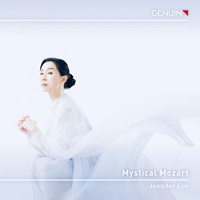Recording all of the 18 piano sonatas by Wolfgang Amadeus Mozart is no small project that can be completed « in passing. » When did the desire to tackle this mammoth task awaken in you?
During the COVID-19 pandemic, I had already planned to record three more Mozart sonatas. Then it hit me that I should just record all of the sonatas, since I already had them in my repertoire for so long. I love Mozart, and it is such a great privilege to be able to make this project come alive (which is perhaps the project of my lifetime).
A glance at the track listing is surprising: You have not arranged the sonatas in chronological order, but – at first glance, it seems – in a wild jumble. Is there a reason for this?
The order is not as ‘random’ as one might think. I believe that storytelling is the most important aspect of music-making, whether in recordings or live performances. Listening to the recorded sonatas, I spent days and weeks thinking about how best to present these brilliant works. The entire 18 sonatas – plus the ever-popular and beautiful C Major Variations – comprise of five complete CD’s. Sitting down and listening to all of the sonatas one after the other – in one sitting, so to speak, in this or any order – might seem daunting at first to the listeners, but should ultimately be very satisfying.
 In 2015, you already recorded Mozart Sonatas 11, 12, and 16. Ten years have now passed. Has your interpretation changed since then?
In 2015, you already recorded Mozart Sonatas 11, 12, and 16. Ten years have now passed. Has your interpretation changed since then?
Hmm… I must have changed a bit over the years, because I recorded this CD in my thirties, and now I’m in my forties and have experienced quite a lot in my life as a human being: My self has evolved, and with it, my music-making, I would think. I find inspiration in different things in life and it would be best if you listen to these recordings and find out for yourself! But ultimately, I am just a pianist humbly presenting Mozart’s divinities to the world, and the music will speak for itself.
You’re Korean, grew up in Canada, studied in Philadelphia and New York, lived in London, and now live in Seoul. Your concert tours take you back and forth between various continents. Can you detect a difference between North American, European, and Asian audiences in your concert performances around the globe? Where is the enthusiasm for Mozart greatest?
I tell my non-musician friends (who also often ask me similar questions) that the European audience are the most engaged, the North American audience the most passionate and the Asian audience the most curious.
What significance does Mozart have in your home country, Korea? Is he only heard in concert halls? Or, similarly to Europe, are his most popular melodies also played as ringtones or on television commercials?
Regarding Mozart’s presence in Korea, he is not only omnipresent here, but a thoroughly international figure – the most popular ambassador of classical music, so to speak. Mozart’s music brings us so much peace and joy.
Finally, a personal question about Mozart: Do you have a favorite sonata among the 18 sonatas?
I love, and indeed adore, every single one of them, and especially the slow movements, and it is so difficult for me to choose just one. If I absolutely had to, it would be these two; the first movement of Sonata Facile no. 16 and the second movement of the last sonata, no. 18. They make me so happy and feel most like my true self. I thank Mozart for these jewels with much heart and love.




















